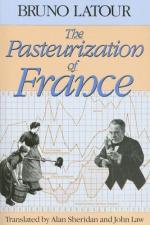|
This section contains 713 words (approx. 3 pages at 300 words per page) |

|
Pasteurization is a process whereby fluids such as wine and milk are heated for a predetermined time at a temperature that is below the boiling point of the liquid. The treatment kills any microorganisms that are in the fluid but does not alter the taste, appearance, or nutritive value of the fluid.
The process of pasteurization is named after the French chemist Louis Pasteur (1822-1895), who is regarded as the founder of the study of modern microbiology. Among Pasteur's many accomplishments was the observation that the heating of fluids destroys harmful bacteria.
The basis of pasteurization is the application of heat. Many bacteria cannot survive exposure to the range of temperatures used in pasteurization. The energy of the heating process is disruptive to the membrane(s) that enclose the bacteria. As well, the bacterial enzymes that are vital for the maintenance of the growth and survival of the...
|
This section contains 713 words (approx. 3 pages at 300 words per page) |

|


